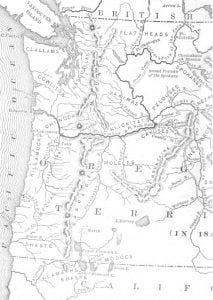Tribes East of the Cascade Mountains Dissatisfied
Several of the tribes east of the Cascade Mountains were dissatisfied with the treaties which had been made with them, for their lands, by Governor Stevens, in the spring of 1855. They did not understand the bargain as the whites did. Chief among these were the Yakimas (Black Bears), a strong tribe of Washington Territory, whose country lay just north of the Klickitats. They were closely united by intermarriage and interest with both the Klickitats and the “King Georges,” or British, and carried on an extensive commerce through all the northern country from the coast to the Rocky Mountains. Their … Read more


